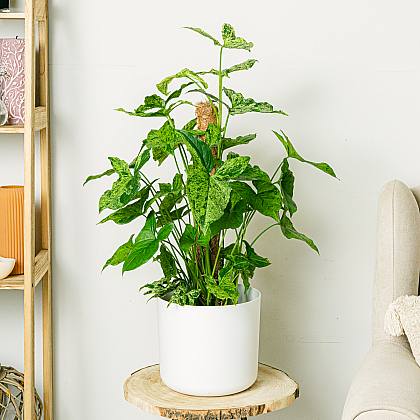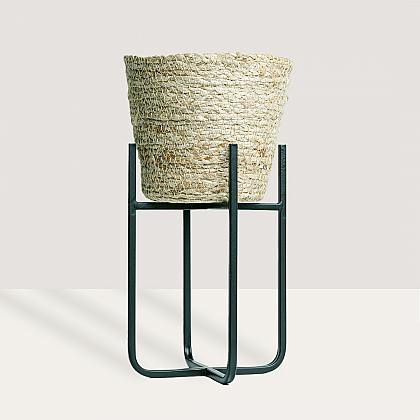Sustainable gardens in Europe thanks to our eco-friendly plants
Sustainable gardening is an increasingly common practice in Europe, and it's not hard to understand why. In a world where concern for the environment is constantly increasing, sustainable gardening has become a way to contribute to caring for the planet
Sustainable gardening is an increasingly common practice in Europe, and it's not hard to understand why. In a world where concern for the environment is constantly increasing, sustainable gardening has become a way to contribute to caring for the planet. But what exactly is sustainable gardening? It is a way of designing, creating and maintaining environmentally friendly gardens, using native plants and eco-friendly practices. In this article, we will explore the economic, social and environmental benefits of sustainable gardens in Europe, as well as the initiatives that are taking place across the region to promote this practice.
Why is sustainable gardening important?
Sustainable gardening is vitally important because of its ability to promote a green and healthy future. In a world increasingly concerned about climate change and biodiversity loss, adopting sustainable practices in our gardens becomes imperative. By using environmentally friendly methods, such as conserving water, using organic fertilizers, and choosing native plants, we can significantly reduce our negative impact on the natural environment.
Sustainable gardening also contributes to preserving the diversity of plant species. By opting for native plants instead of invasive alien species, we are protecting local ecosystems and encouraging the conservation of native species. In addition, these plants are more resistant to diseases and pests, reducing the need to use pesticides and chemical fertilizers.
Another key aspect of sustainable gardening is its ability to create green spaces that promote health and well-being. Sustainable gardens provide habitats for pollinating insects and birds, improve air quality by absorbing carbon dioxide and releasing oxygen, and reduce stress and anxiety by offering a calm and relaxing natural environment.
In short, sustainable gardening is important because it allows us to live in harmony with nature. By adopting environmentally friendly practices and choosing eco-friendly plants, we can contribute to caring for the planet, preserving biodiversity and improving our quality of life.
Native Plants and Their Role in Garden Sustainability
Native plants play a key role in the sustainability of gardens, as they are adapted to the climatic and soil conditions of the region, meaning they require less water, fertilizers, and pesticides. In addition, native plants provide food and shelter for local wildlife, including pollinating insects and birds. The introduction of exotic species can upset the ecological balance of the garden, as they can become invasive and displace native plants. Therefore, it is important to use native plants as much as possible to create a sustainable garden. When choosing native plants, one should consider their life cycle and their ability to resist diseases and pests without the need for chemicals. In addition, the size that the plants will reach at maturity should be taken into account to avoid the need for excessive pruning. Choosing native plants can also have aesthetic benefits, as they naturally adapt to the surrounding landscape and can provide a sense of place. In short, the use of native plants in the garden is an effective way to reduce the ecological footprint of the green space and contribute to the conservation of local biodiversity.
How to create a sustainable garden with our eco-friendly plants
Creating a sustainable garden with our eco-friendly plants is an effective way to contribute to caring for the environment. To achieve this, it is important to carefully select the plants that we will use in our garden. Opting for native plants is an excellent option, as they are adapted to the climate and soil of the region, reducing the need for irrigation and chemical fertilizers. In addition, native plants are essential for ecological balance, as they provide food and shelter for local wildlife.
Another aspect to consider is the responsible use of water. We can implement rainwater harvesting systems and use efficient irrigation techniques, such as drip irrigation. In this way, we will reduce water consumption and minimize the impact on water resources.
It is also important to avoid the use of chemical pesticides and herbicides in our garden. Instead, we can use natural methods to control pests and weeds, such as crop rotation or introducing beneficial insects.
In addition, we must encourage biodiversity in our garden. Planting a variety of plant species will attract different types of insects and birds, which will help maintain a natural balance and promote pollination.
In short, creating a sustainable garden with our eco-friendly plants involves choosing native plants, using efficient watering techniques, avoiding the use of harmful chemicals, and encouraging biodiversity. With these practices, we will be actively contributing to the care of the planet and creating a green and healthy environment for ourselves and future generations.
Sustainable Garden Maintenance: Environmentally Friendly Practices
Sustainable garden maintenance involves the use of environmentally friendly practices to care for and preserve biodiversity. One of the most important ways to achieve this is by reducing water consumption. Efficient irrigation is critical to a sustainable garden, using systems such as drip irrigation or installing soil moisture sensors to prevent water waste. Additionally, it is important to use organic fertilizers and avoid using harmful chemicals, such as herbicides and pesticides. Instead, natural methods can be used to control pests, such as introducing beneficial insects or planting repellent species. Another key aspect of sustainable maintenance is proper waste management. Composting pruning scraps and plant waste not only reduces the amount of waste that ends up in landfills, but also provides natural nutrients for plants. In addition, diversity and ecological balance can be encouraged in the garden by planting a variety of native species and promoting the presence of pollinators such as bees and butterflies. In short, maintaining sustainable gardens involves adopting environmentally friendly practices that promote the conservation of natural resources and the protection of biodiversity.
Sustainable gardening initiatives in Europe
In Europe, there are more and more initiatives that seek to promote sustainable gardening. One of the most prominent is the Royal Horticultural Society's "Greening Grey Britain" program in the United Kingdom, which aims to transform grey urban spaces into sustainable green areas. Through this program, more than 100,000 trees have been planted and more than 1,000 community and school gardens have been created throughout the country.
On the other hand, in Spain, the organization "Gardens without Borders" works to promote biodiversity and the conservation of the country's green heritage. This organization promotes the use of native plants and sustainable gardening techniques in public parks and gardens, as well as in private spaces. In addition, it offers courses and workshops to raise awareness about the importance of sustainable gardening.
Another noteworthy initiative is the "Jardins sans Limites" project in France, which aims to create ecological gardens accessible to all people, including those with physical or sensory disabilities. This project seeks to promote social inclusion and biodiversity through adapted and environmentally friendly gardens.
In summary, sustainable gardening initiatives in Europe seek to promote environmental conservation and encourage biodiversity through environmentally friendly practices. These initiatives not only have a positive impact on the environment, but also on society, as they promote social inclusion and improve people's quality of life through contact with nature.
Economic, social and environmental benefits of sustainable gardens
Sustainable gardens are not only beneficial to the environment, but can also bring economic and social benefits. In economic terms, sustainable gardens can reduce energy and water costs by using native plants that require fewer resources to grow and maintain. In addition, creating and maintaining sustainable gardens can lead to jobs in the landscaping and construction industry.
In terms of social benefits, sustainable gardens can be a community gathering place, fostering social interaction and a sense of community. They can also improve people's mental and physical health by providing a green space to relax and connect with nature. Sustainable gardens can also be used as an educational tool to teach people about caring for the environment and the importance of biodiversity.
Finally, sustainable gardens are an effective way to contribute to caring for the planet. By using native plants, biodiversity conservation is promoted and the use of pesticides and chemical fertilizers is reduced, which decreases soil and water pollution. Additionally, sustainable gardens can help reduce greenhouse gas emissions by sequestering carbon in plants and soil.
In conclusion, sustainable gardens are not only beneficial to the environment, but can also bring significant economic and social benefits. It is important to encourage the creation of sustainable gardens in communities and homes to contribute to the care of the planet while enjoying its many benefits.
Sustainable gardens: a way to contribute to caring for the planet
Sustainable gardens are a way to contribute to caring for the planet. These green spaces not only beautify our surroundings but also promote environmentally friendly practices. By opting for a sustainable garden, we are choosing eco-friendly plants that require less water and pesticides, reducing soil and water pollution. In addition, by using native plants in our gardens, we are encouraging biodiversity conservation and protecting local ecosystems. Sustainable gardens can also include items such as composting and rainwater harvesting, helping to reduce waste and drinking water consumption. Another advantage of these gardens is that they require less maintenance, which means less energy and resource use. In addition, sustainable gardens can serve as a haven for local wildlife, providing natural habitats and contributing to the conservation of species. In short, opting for a sustainable garden is a practical and effective way to contribute to the care of the planet, promoting the conservation of natural resources, the protection of biodiversity and the reduction of environmental pollution.
In short, sustainable gardens are an excellent option to contribute to the care of the planet. From using native plants to implementing environmentally friendly practices in their maintenance, these green spaces can have a significant impact on biodiversity conservation and ecological footprint reduction. In addition, they not only provide environmental benefits, but also generate positive impacts on the local economy and people's mental and physical health. However, it is important to reflect on how we can further encourage these initiatives and promote their implementation in different settings, from homes to public and business spaces. In this sense, education and awareness are key to achieving a green and sustainable future for all


